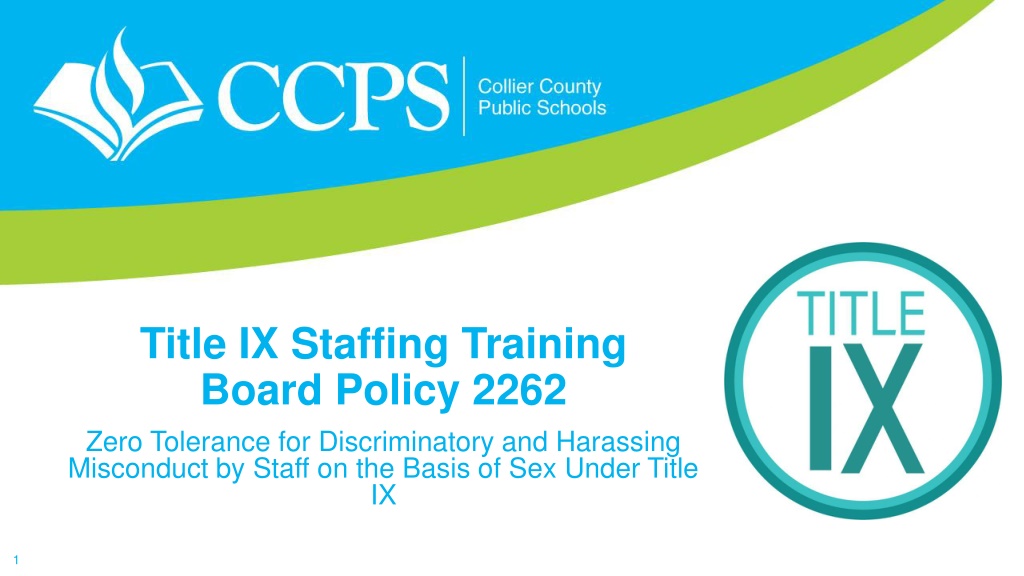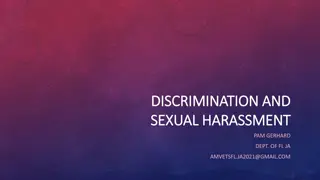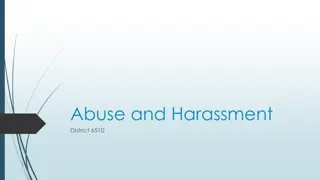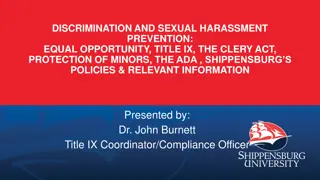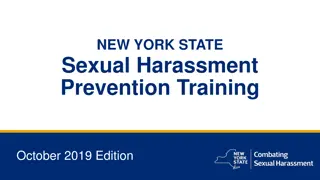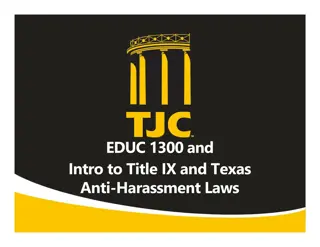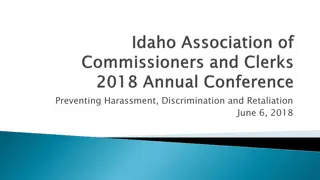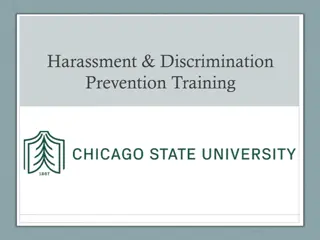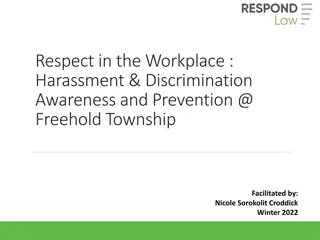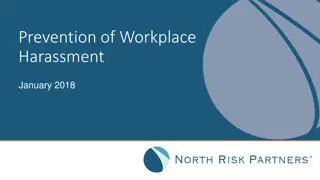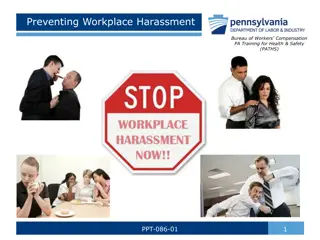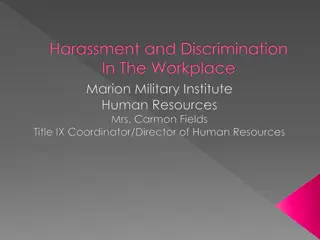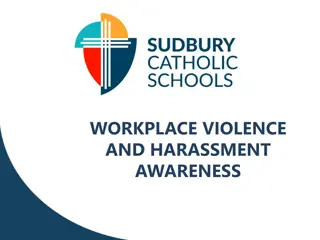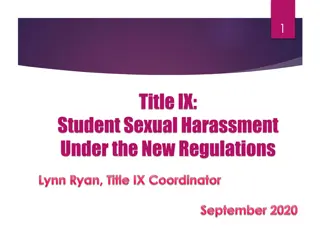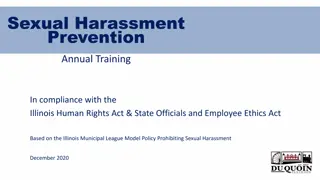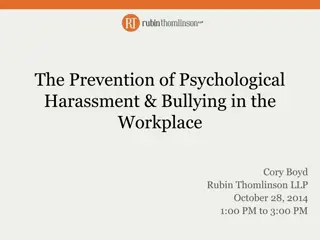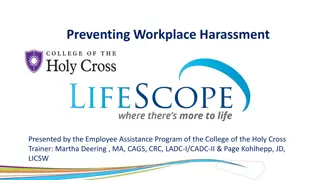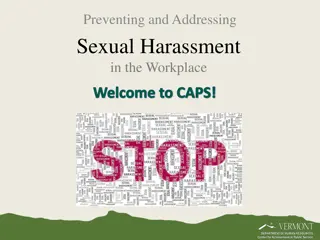Title IX Policy Overview: Addressing Discrimination and Harassment
This document provides an overview of Title IX policies related to discriminatory and harassing misconduct based on sex within educational programs. It covers the application of the policy, general principles of sexual discrimination, and the processes involved in handling complaints, investigations, determinations, grievances, and appeals under Title IX regulations.
Download Presentation

Please find below an Image/Link to download the presentation.
The content on the website is provided AS IS for your information and personal use only. It may not be sold, licensed, or shared on other websites without obtaining consent from the author. Download presentation by click this link. If you encounter any issues during the download, it is possible that the publisher has removed the file from their server.
E N D
Presentation Transcript
Title IX Staffing Training Board Policy 2262 Zero Tolerance for Discriminatory and Harassing Misconduct by Staff on the Basis of Sex Under Title IX 1
Introduction Over the last several months, the United States Department of Education (USDOE) undertook a sweeping review and revision of handling and investigating of Title IX complaints. The revisions included definitional changes, investigative and decision-making oversight, processes and procedures, standards of evidentiary review and process considerations, and so on. This training will serve to guide you through that as a matter of District policy. 2
Application of the Policy While all forms of sex-based discrimination are prohibited in the District, the purpose of this policy is to address sexual harassment as defined in the Title IX regulations that occur within the educational programs and activities of the District It also provides guidance on the complaint process, supportive measures, investigative process, determination of the investigation, grievance process, final resolution and the appeals process This training will provide an overview of Title IX regulations, definitions, investigative procedures, determination/appeals, and records preservation 3
Title IX: General Principles Pertaining To Sexual Discrimination and Harassment Title IX provides the following core principle: No person in the United States shall, on the basis of sex, be excluded from participation in, be denied the benefits of, or be subjected to discrimination under any education program or activity receiving Federal financial assistance School Districts receiving funds under Title IX, whether direct or pass-through grants, are thus subject to the provisions of Title IX 4
Title IX: General Principles of Sexual Discrimination and Harassment Discrimination misconduct on the basis of sex is conceptually related to harassing misconduct on the basis of sex. Title IX analysis asks whether the alleged misconduct was undertaken on the basis of sex. Discriminatory misconduct on the basis of sex involves the following: Treating one person differently from another in determining whether such person satisfies any requirement or condition for the provision of such aid, benefit, or service Providing different aid, benefits, or services, or provide aid, benefits, or services in a different manner Denying any person such aid, benefit, or service Subjecting any person to separate or different rules of behavior, sanctions, or other treatment 5
Definitions Complainant An individual who is alleged to be the victim of conduct that could constitute sexual harassment, whether or not that person files a report or formal complaint Respondent Is an individual who is reported to be the individual accused of conduct that could constitute sexual harassment. Under Title IX, there is a presumption of non-wrongdoing by the Respondent during the formal complaint and investigatory process 6
Definitions Title IX Coordinator Assigned by the Superintendent Responsible for: Meeting with complainant, informing parent/guardian once becoming aware of allegations of conduct that meets the definition and conditions of sexual harassment Identification and implementation of support measures Signing or receiving formal complaints of sexual harassment Engaging with the parents/guardians of parties to any formal complaint of sexual harassment Coordinating with District and school-level personnel to facilitate investigations, remedies and helping assure meets the obligations of reports and complaints Determining whether there is jurisdiction to proceed with the claims in the formal complaint or whether it should be dismissed 7
Definitions Sexual harassment (SH) Conduct on the basis of sex (including, without limitation, gender, sexual orientation, and/or gender identity), occurring in a school system education program or activity that satisfies one or more of the following: Quid Pro Quo: Conditioning the provision of aid, benefit or service of an education program or activity on an individual s participation or refusal to participate in sexual conduct, irrespective of whether the conduct is welcomed by the student or other employee Hostile Environment: Unwelcome sex-based/related conduct determined by a reasonable person to be so severe, pervasive AND offensive that it effectively denies a person equal access to the education program or activity OR Sexual assault, dating violence, domestic violence, or stalking as defined in state or federal law 8
What Behaviors Constitute Sexual Harassment Sexually suggestive remarks or jokes Verbal harassment or abuse Displaying or distributing sexually suggestive pictures (drawings, photographs, videos) Sexually suggestive gesturing, including touching oneself in a suggestive manner in front of others or groping others Harassing, sexually suggestive or offensive messages that are written or electronic Subtle or direct propositions for sexual favors or activities Teasing or name-calling related to sexual characteristics or the belief an individual in not conforming to expected gender roles or conduct 9
Definitions Actual knowledge (AK) Under the new regulations, the new standard of review is actual knowledge instead of the previous Title IX standard of review of known or should have known. This means that when any employee receives notice, report or information or becomes aware of sexual harassment or allegations of sexual harassment he/she is presumed to have actual knowledge and has a mandatory obligation to report the matter to the Title IX Coordinator Educational Program (EP) Locations, events or circumstances over which the recipient exercised substantial control over both the respondent and the context in which the sexual harassment occurs substantial control recipient funded, promoted or sponsored event (includes off campus is recipients event (operated and controlled) 10
Definitions Formal Complaint: A Formal Complaint is the document filed by the Complainant, the Complainant s parent or guardian, or the Title IX Coordinator after consultation and agreement by the Complainant or the Complainant s parent or guardian (if the student is under 18). The document must allege sexual harassment against a Respondent and must request the District to investigate such allegations. A report of sexual harassment is not enough to trigger an investigation. There must be an actual Formal Complaint in writing. If only a report is provided, the District may investigate the allegations under another policy or the Code of Student Conduct. A Formal Complaint must contain, at a minimum, the following: (1) the name and address of the Complainant and the Complainant s parent or guardian if he/she is a minor student; (2) a description of the alleged sexual harassment; (3) a request to investigate; and (4) the signatures of the Complainant 11
Definitions Investigator: The person to whom the Title IX Coordinator will assign a Formal Complaint for investigation. The Investigator s role is to be a neutral fact finder who will gather evidence from the Complainant, Respondent, and third party witnesses as he/she deems appropriate and necessary for the investigation. Such evidence received may include both inculpatory evidence (evidence that tends to excuse or clear the Respondent of responsibility). At the conclusion of the investigation, the Investigator will make no determination. His/her duty and responsibility is to prepare a factual report and provide it to an independent Decision- Maker 12
Definitions Decision-Maker: The person tasked with making what the rules refer to as the determination of responsibility with respect to the Formal Complaint. The decision-maker s role involves conducting an objective and impartial evaluation of all relevant evidence received from the Investigator and the parties. The determination of responsibility is the formal finding made by the Decision-Maker on each allegation of sexual harassment contained in the Formal Complaint as to whether or not the Respondent engaged in conduct constituting sexual harassment in violation of Title IX and this Policy. If either party appeals the matter, a separate Decision-Maker shall be assigned to make a final determination. Please Note: The Decision-Maker s determination shall be based upon the evidentiary standard of a prepondence of the evidence which means making a determination based upon the greater weight of the evidence demonstrating whether or not the conduct complained of was more likely or not to have occurred. 13
Definitions Supportive Measures Free, non-disciplinary, no-punitive, individualized services and shall be offered to the complainant, and may be offered to the respondent, as appropriate Measures may include Counseling Course modifications Schedule changes Increased monitoring or supervision Any service designed to restore or preserve equal access to the District s education programs and activities without unreasonable burden to the other party Please Note: The purpose of supportive measures is not only to assist one or both parties, but also to restore or preserve equal access to the District s education programs or activities. Such measures are confidential unless otherwise required by law 14
Definitions Third Parties: Third Parties include, but are not limited to, guests and/or visitors on District property (e.g., visiting speakers, participants on opposing athletic teams, parents), vendors doing business with, or seeking to do business with the Board, and other individuals who come in contact with members of the School District community at school-related events/activities (whether on or off District property). There is nothing in these provisions that are to be construed as conferring a right to due process on any third party unless any such right can be established as applicable under prevailing law. Any third party (volunteers, guests, visitors, vendors, and so on) who is reported to or is known to have engaged in sexual harassment (including stalking, dating violence, or domestic violence involving a District student or employee) will be directed to leave school property immediately and law enforcement and the Department of Children and Family Services ( DCF ) will be promptly notified. Any such party will be subject to termination of contracts, agreements, and restricted from access to school property 15
Definitions Retaliation: Under 34 C.F.R. 106.71, retaliation is defined, in pertinent part as follows: No recipient or other person may intimidate, threaten, coerce, or discriminate against any individual for the purpose of interfering with any right or privilege secured by Title IX or this part, or because the individual has made a report or complaint, testified, assisted, or participated or refused to participate in any manner in an investigation, proceeding, or hearing under this part Acts of retaliation must be promptly reported to the Title IX Coordinator Determine whether any act of retaliation warrants the necessity of a no- contact order Retaliatory acts include abuse, violence, threats, intimidation and adverse acts against another. Such actions/conduct is more than someone merely expressing his/her opinion 16
What triggers Title IX? AK + EP + SH + US = Title IX Actual knowledge + educational program/activity + sexual harassment + United States = The Districts obligation to investigate and provide supportive measures to the victim (employee or students) 17
Responding to Reports of Harassment Mandatory Reporters All formal written complaints of sexual harassment involving a District employee or any other adult member of the School District community against a student or student against student will be promptly investigated. Prompt reporting and investigation reduce the risk of deliberate indifference by the District Steps to responding Any complaint of sexual harassment should be sent to the immediate attention of the Title IX Coordinator Dr. Caraker The Title IX Coordinator will undertake prompt and immediate review and promptly contact the complainant to discuss supportive measures Title IX Coordinator will consult with the Coordinator of Employee Complaints (Valerie Wenrich), Coordinator of Student Complaints (Steve McFadden), or the Coordinator for Post-Secondary Programs (Yolanda Flores) to coordinate an investigation Trained investigators will proceed with the investigative process in accordance with the USDOE rules 18
Filing a Complaint Provide to the Title IX Coordinator Report of sexual harassment may be made at any time, in person, by mail, by email, by phone or any means that result in the Title IX Coordinator receives the person s verbal or written report In addition, a report or formal complaint can be made to any District Staff, including, for instance, a counselor, teacher or principal Rule of Thumb: When in doubt, notify. District will promptly respond when there is (AK) actual knowledge of sexual harassment even if a formal complaint has not been filed Once a formal complaint is received, Title IX Coordinator shall commence the grievance process Note: no disciplinary consequence can be imposed until the grievance process is completed For safety of an immediate threat, an employee or student may be removed and an employee placed on administrative leave for the duration of the risk 19
Jurisdiction Under 34 C.F.R. 106.44, the Title IX Coordinator must determine the formal complaint is jurisdictionally viable. Jurisdiction means whether legal criteria have been met to proceed with a formal complaint. The regulations provide the following: If the conduct alleged in the formal complaint would not constitute sexual harassment even if proved, did not occur in the recipient s education program or activity, or did not occur against a person in the United States, then the recipient must dismiss the formal complaint with regard to that conduct for purposes of sexual harassment under Title IX or this part; such as dismissal does not preclude action under another provision of the recipient s code of conduct. 20
The Investigation Process and Standards of Fairness The burden of proof and burden of gathering evidence is on the District as the recipient of Federal funds There must be equal opportunity to present witnesses for both the Complainant and the Respondent The Parties cannot be prevented from discussing allegations or gathering/presenting evidence The same opportunity to have others present must be provided to the parties; including the advisor of choice There must be written notice of any interview or meeting The evidentiary standards of review is by a prepondence of the evidence . This will be applicable to all complaints of sexual harassment whether or not the formal complaint is against a student or an employee 21
Due Process and the Importance of Being Impartial in the Investigative and Decision Making Process Being impartial means being free from bias and not pre-judging the facts Being impartial means not having a conflict of interest that could demonstrate, whether explicitly or implicitly, that one might favor one party over the other. This also includes the appearance of potential bias Being impartial means keeping an open mind (a) in the process of interviewing and document gathering; and (b) as a decision- maker Each case is unique, different, and exists on its own terms Avoid sexual stereotyping which will affect evidence based information gather and reporting 22
The Investigative Process and the Problem of Trauma Do not assume that because there are signs of trauma, the trauma was caused by the respondent and, therefore, the respondent violated the policy Do not assume that because there are not signs of trauma, therefore nothing bad happened Both parties may be traumatized. Yet, their trauma may not be related to the incident you are investigating Be mindful of the potential responses to trauma. These may include delayed or reluctant reporting; difficulty in remembering specifics of the incident (perhaps because of drugs or alcohol); appearing calm and composed after an assault or battery; not being able to identify the accused; and not leaving an abusive relationship with the Respondent 23
The Investigative Process and the Problem of Trauma Trauma affects responses to the event and could involve fight or flight or freezing (psychological paralysis) The Complainant may be afraid to come for because of fear of retaliation or fear of not being believed Thus, the Investigator must be mindful of trauma and traumatic behaviors when he meets with the Complainant or the Respondent, especially for the first time Such mindfulness can prevent the experience of retraumatization and allow for an understanding and supportive interview and relational process Thus, the Investigator needs to be attentive not only to word choice but also culture, gender, age, and whether either party has difficulties with authority figures and may be casting him/her in that role 24
The Investigative Process and the Problem of Trauma Sexual assault occurring as a result of drug or alcohol abuse is common. The most common form is alcohol consumption Remember: The fact the Respondent was drunk doesn t excuse the Respondent s behavior, including claims of blacking out, memory loss, etc. There are a wide variety of responses that a victim of trauma may present including calm, hysterical, angry, in denial, detached, withdrawn, or in shock based behaviors. Thus, don t make assumptions about how they should act . If the Investigator is concerned he/she is making any such assumptions he or she should inquire/speak with another whether the assumptions are accurate/factually grounded 25
The Investigative and Decision-Making Process and the Problem of Relevancy Under the regulations (34 CFR 106.45(b)(1) and (b)(b)), privileged and protectable information cannot be considered as relevant information during an investigation of a formal Complaint. Such information would include the following: Information protected by a legally recognized privilege, unless waived, such as attorney-client communications, spousal communications, confessions to a clergy member, and so on Evidence about complainant s prior sexual history unless such questions/evidence about the complainant s prior sexual behavior are offered to provide that someone other than the respondent committed the conduct or if the questions/;evidence concern specific incidents of the complainant s prior sexual behavior with respect to the respondent and are offered to prove consent Party s medical, psychological, and similar treatment records unless voluntary written consent is provided 26
The Initial Determination of Responsibility and the Appeals Process The report provided by the Decision-Maker after the conclusion of the investigation, and questions and responses from the parties, is known as the Initial Determination of Responsibility The parties may appeal this report by notifying the Superintendent and the Title IX Coordinator in writing within ten (10) days after the Determination of Responsibility was communicated to the parties. An appeal may only be based on one or more of the following bases which must be specifically stated in the written request for an appeal: (a) procedural issues, including any procedural irregularities, that affected the outcome; (b) new evidence that was not reasonably available at the time the written determination or dismissal was made that has become available and could affect the outcome of the matter; or (c) there was a conflict of interest or bias by the school- based Title IX Coordinator, investigator, or decision-maker, against the Complainant or Respondent that affected the outcome of the matter Appeals for any other reason will not be considered. In this regard, appeals of disciplinary sanctions must follow the District s ordinary review process under the Code of Student Conduct or other District Policy, or pursuant to a relevant provision in a collective bargaining agreement in place at the time the determination was made 27
The Appeal Process The Superintendent will appoint a Decision-Maker (different from the initial one) to handle the appeal Each party shall have 10 days from the date the Notice of Appeal is communicated to the parties to submit to the appellate Decision-Maker a written statement, which copies to the Superintendent, Title IX Coordinator, and other party support of, or challenging, the Determination of Responsibility of the initial Decision-Maker or dismissal. If the basis of the appeal is newly available evidence affecting the outcome, the party shall submit such evidence or a summary of such evidence along with the party s appeal statement After reviewing the record and appeal statements of the parties, the Decision-Maker shall provide a written decision. The Initial Determination of Responsibility will be over turned only upon a showing that it was clearly erroneous (i.e., because it was either made on unreasonable grounds, or without proper consideration of all the circumstances, facts, documents, and issues in evidence. The appellate Decision- Maker cannot reweight the evidence or make credibility determinations except with respect to new evidence provided as the basis for the appeal.) If one of the bases for appeal was new evidence, then the appellate Decision-Maker may either make a determination of responsibility regarding that evidence, or refer it back to the investigative stage of the process. The appellate Decision-Maker will so notify the Title IX Coordinator and the parties since this would delay the filing of the final determination. The decision of the appeals Decision-Maker shall be deemed to be final 28
Emergency Removal and Administrative Leave At any point after receiving either a report or Formal Complaint of sexual harassment, the Title IX Coordinator, after consultation with the Superintendent, may request an individualized safety and risk analysis be performed to determine whether the reported student, or the Respondent, if a Formal Complaint has been filed, is an immediate threat to the physical health or safety of any person. In the event hat the safety and risk analysis determines that the Respondent student does present an immediate threat to the physical health and safety of any person, the District may remove that student, provided that such removal is in full compliance with the Individuals With Disabilities Education Act ( IDEA ), a student s Individualized Education Program ( IEP ) and/or Section 504 plan if applicable Such emergency removal shall not, in any way, be considered to be disciplinary in nature and will not affect the presumption that the Respondent has not violated this Policy. Moreover, the District must provide the Respondent with notice and an opportunity to challenge the decision immediately following the removal. The District shall continue to provide the removed student with full educational programming and opportunities available as a matter of right to a free and appropriate education (FAPE) until a final determination is made pursuant to the Title IX Grievance Process 29
Grievance Timeline Investigation 20+/- days as the complexity of the case demands 10 days for reviewing information prior to the conclusion of investigation 10 days after receiving report to respond to report 10 days for decision maker to allow initial questions 10 days for responses to questions 10 days for questions and responses to follow-up questions 10 days for determination of responsible decision 10 days for appeal 10 days for argument/statement challenging or supporting determination 10 days for decision on appeal 30
Mandatory Reporting Example situation A school cafeteria worker overhears Student A tell Student Bthat Student A was abused by Student A s girlfriend in a classroom last weekend after band practice What do you do? Does the cafeteria worker have an obligation to report? YES You must report to the Title IX Coordinator 31
Remedies: Range of Disciplinary Sanctions Upon Final Determination Disciplinary Sanctions are consequences imposed on a respondent when he/she is found responsible for sexual harassment under policy Remedial actions are intended to restore or preserve a complainant s equal access to the educational programs or activities of the District Sanctions against an employee may include: Any discipline up to and including termination Sanctions against a student may include: Any discipline up to and including expulsion under the rules of the code of conduct Remedial actions may be: No contact requirement, scheduling adjustment, removal or exclusion from extracurricular activities, class reassignment, restricted access to various spaces in the school or any response appropriate to surrounding a successful complainant s right to access the District s program and activity 101 32
Honoring Boundaries The way to avoid liability for wrongful conduct Harassing misconduct of whatever kind (sexual, racial, national origin, disability, and so on) and bullying behaviors typically originate in a boundary violation where another s space and physical and/or psychological integrity is not honored. A boundary is often understood as a physical, emotional, intellectual, or material limit that establishes one s personal world as separate and distinct from another s. It recognizes the dignity and integrity of each individual in relation to another. Boundaries also establish limits as to what words, actions, behaviors will be tolerated from others (unclear and porous boundaries may be an invitation for others to cross over into your territory) 33
Honoring Boundaries The way to avoid liability for wrongful conduct Healthy boundaries help to keep toxic behaviors, words, and actions (such as abusiveness, manipulation, harassment, and contempt) out of your life and actually enhance communication In one of Robert Frost s poems he wrote: Good fences make good neighbors Honoring boundaries enhances self-responsibility to respect the dignity of another and being able to communicate such self- responsibility to respect another in an appropriate way. Setting healthy boundaries does not separate people. They actually help relationship building 34
Honoring Boundaries The way to avoid liability for wrongful conduct Psychological limits, like physical limits, help establish personal dignity and integrity and convey to another one s dignity and integrity are not to be tampered with. (We use expressions such as you ve crossed the line , get out of my space , I don t appreciate that , and so on to make one aware that violation of one s boundaries is unacceptable) We all know the meaning and consequences of when one country s forces crosses the border into another country 35
Honoring Boundaries The way to avoid liability for wrongful conduct Mental, emotional, physical, and material boundaries are four areas we use for limit setting Halting and/or intervening in boundary violations (whether experienced, observed, or reported) at the moment of occurrence is important for both the present and the future Bring up the matter of a violation right away. If one is drawn into a possible violation, politely advise at the moment it is invited, occurring, or experienced that you do not want to participate The problem of triangulation, gossip, and boundaries 36
Educator Misconduct and Mandatory Reporting Connection to Board Policy 3139 REMINDER! When in doubt .report Apply the litmus test If you feel uncomfortable If you question the person s motives or actions If you are unsure It is the responsibility of all employees to promptly report to HR, any complaint against a certified instructional staff member, athletic coach, or administrative employee that comes to the employees attention Willful failure by an employee to promptly report a complaint shall constitute cause for discipline of the employee as provided by Board policy and law District/school will notify law enforcement and DCF of any alleged misconduct by certified staff, athletic coaches, and administrators which affects the health, safety, or welfare of a student 37
Title IX Coordinator Contact Information Dr. Tammy Caraker Valerie Wenrich Steve McFadden Yolanda Flores Title IX Coordinator Coordinator of Employee Complaints Coordinator of Student Complaints Coordinator of Post-Secondary Complaints 239- 377- 0202 239- 377- 0351 239- 377- 0517 239- 377- 0904 38
